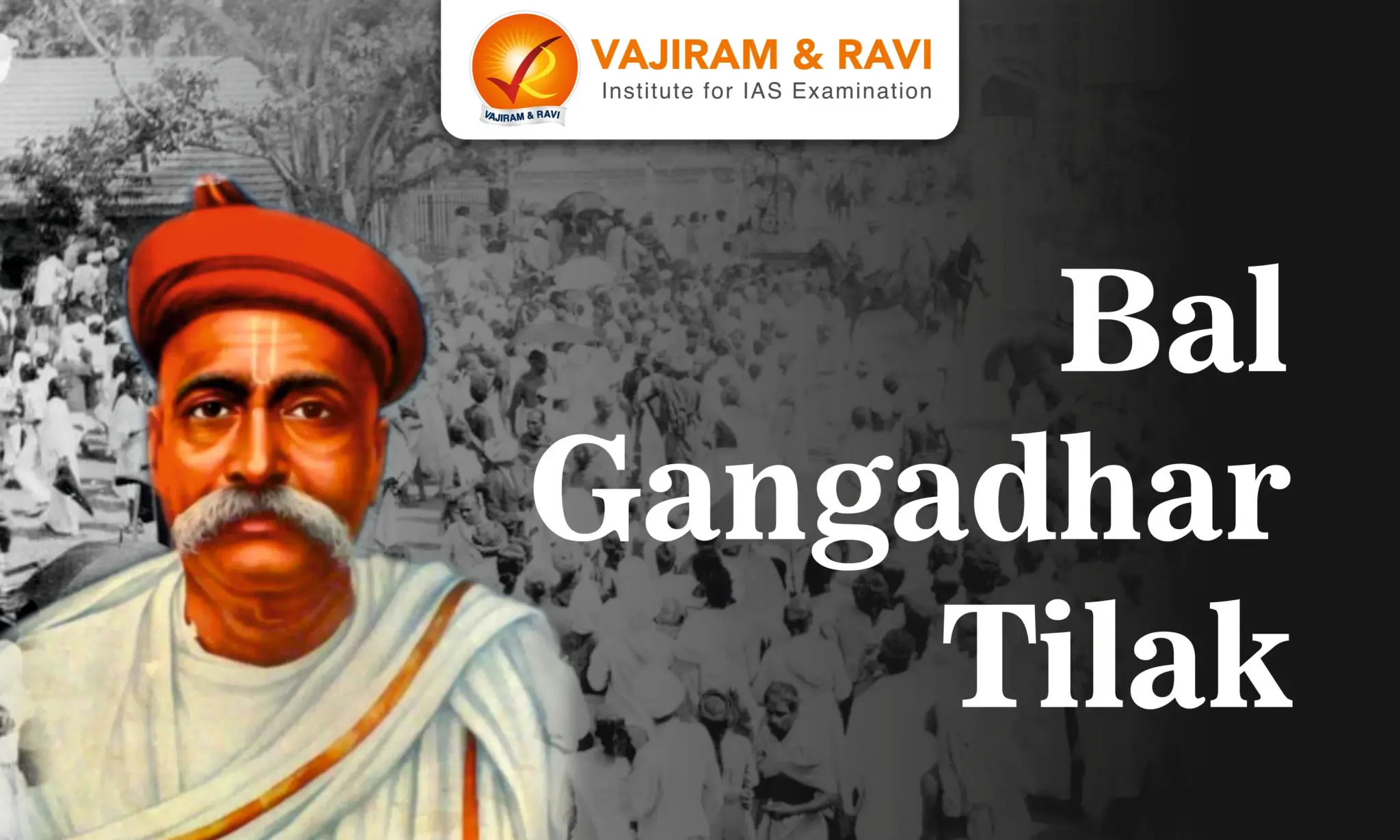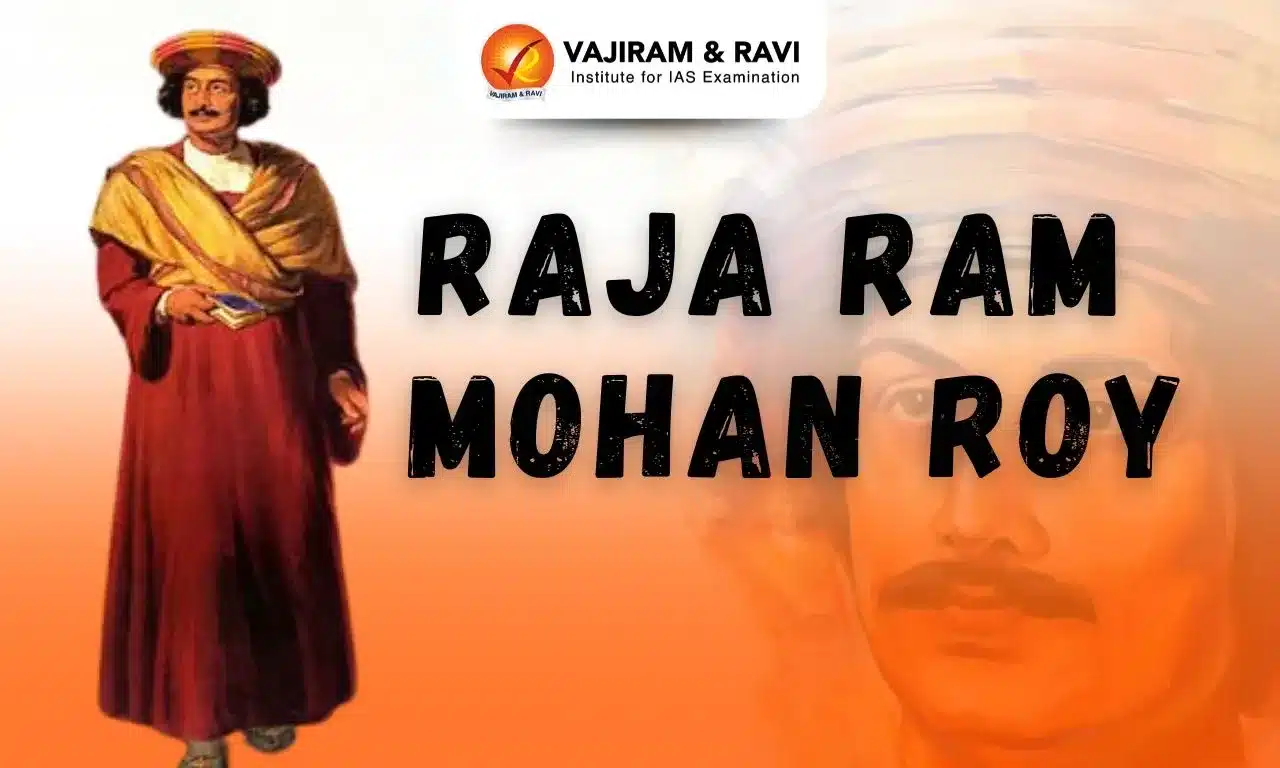Bal Gangadhar Tilak, born as Keshav Gangadhar Tilak, was a prominent Indian nationalist, widely regarded as Lokmanya, meaning “accepted by the people as their leader.” Tilak was one of the most influential leaders in the freedom struggle and a member of the famous Lal-Bal-Pal trio, along with Lala Lajpat Rai and Bipin Chandra Pal.
Tilak was among the first to strongly advocate for Swaraj (self-rule) and a staunch advocate of Hindu culture, social reforms, and education. The British labelled him “The father of Indian unrest” for his radical stance against colonial rule.
Bal Gangadhar Tilak
Bal Gangadhar Tilak also known as “Lokmanya,” was born in a Chitpavan Brahmin family on July 23, 1856, in Ratnagiri, Maharashtra. Lokmanya Tilak completed his Bachelor of Arts degree in Mathematics from Deccan College, Pune, in 1877. Though he initially pursued a Master of Arts, he decided to shift focus and enrolled in an L.L.B. program, and in 1879 he obtained his L.L.B degree from Government Law College.
Bal Gangadhar Tilak Political Career
Lokmanya Tilak’s political career began in the late 19th century when he became an active member of the Indian National Congress (INC). His fiery speeches and writings made him one of the most prominent leaders of the early nationalist movement. Tilak’s approach was in sharp contrast to the moderate leaders of the INC, as he advocated for direct action and self-rule, rather than gradual reforms under British rule.
- Due to his advocacy for self-rule, Tilak had to spend a considerable amount of time behind bars, including one extended stay in Mandalay.
- British author Sir Valentine Chirol dubbed him “the father of Indian unrest” at one point in his political career.
Bal Gangadhar Tilak Association with INC
Lokmanya Tilak joined the Indian National Congress (INC) in 1890 and quickly emerged as a prominent leader opposing the party’s moderate stance, particularly regarding the fight for self-government. Alongside other extremist leaders like Lala Lajpat Rai and Bipin Chandra Pal, he advocated for Swaraj (self-rule).
- Tilak’s association with the INC was characterized by his strong views on nationalism and his push for mass participation in the freedom movement.
- His influence was especially evident during the Swadeshi movement of 1905–1907, which intensified the ideological divide within the INC and ultimately led to the Surat Split in 1907.
Bal Gangadhar Tilak Freedom Movement
Between 1900 and 1908, revolutionary nationalism surged in India, led by Lokmanya Tilak, Bipin Chandra Pal, and Lala Lajpat Rai. These leaders fostered unity and nationalism among Indians. Lokmanya Tilak, in particular, with his pragmatic approach, introduced a four-point program: Swadeshi (self-reliance), boycott (of British goods), national education, and Swarajya (self-rule).
- In late 1896, the bubonic plague epidemic in Pune led to oppressive measures by the British, sparking widespread resentment. Bal Gangadhar Tilak capitalized on this discontent through Kesari, justifying resistance against oppression with references to the Bhagavad Gita.
- This tension culminated in the assassination of Commissioner Rand and Lt. Ayerst by the Chapekar brothers, influenced by Tilak’s rhetoric, resulting in his imprisonment.
- Upon release, Bal Gangadhar Tilak became a pivotal figure in driving the Swadeshi and Boycott campaigns in reaction to Lord Curzon‘s divisive Partition of Bengal, which was intended to weaken the nationalist movement.
- He urged Indians to boycott foreign goods and embrace indigenous products, emphasizing economic self-reliance.
- In his efforts to galvanize the masses, Tilak adopted the powerful slogan coined by his associate, Kaka Baptista: “Swaraj is my birthright, and I shall have it.”
Bal Gangadhar Tilak Home Rule Movement
In 1916, Tilak, along with Annie Besant, founded the All India Home Rule League. While Besant’s Home Rule League was active in most parts of India, Tilak established his Home Rule League in the Maharashtra, Central Provinces, Karnataka, and Berar regions. Tilak’s role in the Home Rule Movement was pivotal, as he embarked on a nationwide tour to rally support for Home Rule.
- Tilak penned influential editorials under the title Hindu Swarajya Sangh, outlining a strategic plan for achieving self-rule.
- In 1918, as President of the Indian Home Rule League, Tilak travelled to England, where he held public meetings and established important connections with British Labour Party leaders.
Bal Gangadhar Tilak Sedition Charges
Throughout his political career, Bal Gangadhar Tilak faced sedition charges on three separate occasions. In 1897, he was sentenced to 18 months in prison for inciting disaffection against British rule. His second arrest came in 1908, following his articles in Kesari, which criticized colonial oppression, leading to a six-year sentence in Mandalay Jail. The third instance occurred in 1916 when Tilak was charged for advocating self-rule in his speeches. This time, Muhammad Ali Jinnah served as his lawyer and successfully secured his acquittal.
- After his release, Tilak sought reconciliation with the Congress, abandoning his demand for direct action in favour of agitations “strictly by constitutional means,” a stance long advocated by his rival Gokhale.
- He reunited with fellow nationalists and rejoined the Indian National Congress during the Lucknow Pact in 1916.
Bal Gangadhar Tilak Social Views
Bal Gangadhar Tilak held conservative views on various social issues, often opposing the emerging liberal trends of his time. He strongly resisted reforms related to women’s rights and the upliftment of marginalized communities.
- In 1885, Tilak vehemently opposed the establishment of the first Native Girls’ High School in Pune.
- He also disapproved of intercaste marriages, especially unions where upper-caste women married men from lower castes.
- He opposed the Age of Consent Bill that sought to raise the minimum marriage age for girls from 10 to 12 years because he believed that the government should not regulate social customs or ways of living.
- Although he was against untouchability, he refused to sign a 1918 petition aimed at abolishing untouchability.
Bal Gangadhar Tilak Social Contributions
In 1894, Bal Gangadhar Tilak transformed the traditional household worship of Lord Ganesha into a public celebration, giving rise to the Sarvajanik Ganeshotsav. The following year, he established the Shri Shivaji Fund Committee to celebrate the Shivaji Jayanti. Through these grand festivals, Tilak aimed to inspire a sense of national unity and identity, especially beyond the educated elite. Tilak’s other key social contributions include:
- He co-founded the New English School in 1880, along with Gopal Ganesh Agarkar, Mahadev Ballal Namjoshi, and Vishnushastri Chiplunkar, to improve the quality of secondary education for Indian youth.
- He also established the Deccan Education Society in 1884 to promote nationalist ideas and Indian culture through education.
Bal Gangadhar Tilak Literature
Tilak was not only a politician but also a scholar and journalist/writer. Kesari, a Marathi weekly, and Mahratta, an English weekly, were launched by him. These became platforms for promoting his political ideas and advocating for India’s freedom.
- His most significant literary contribution was The Arctic Home in the Vedas, where he argued that the original home of the Aryans was the Arctic region.
- Another significant work he produced while imprisoned in Mandalay was Gita Rahasya, a commentary on the Bhagavad Gita.
- In his scholarly work The Orion, Tilak attempted to calculate the age of the Vedas by analyzing the positions of various Nakshatras
Bal Gangadhar Tilak Legacy
Bal Gangadhar Tilak passed away on August 1, 1920, in Mumbai. His death marked the end of an era in the Indian independence movement, but his ideas and contributions continued to inspire future leaders, including Mahatma Gandhi and Jawaharlal Nehru. To honor his contributions, the Tilak Swaraj Fund was announced by Mahatma Gandhi in 1921 on the first anniversary of Tilak’s death. The fund aimed to raise Rs 1 crore to support the Non-cooperation Movement and reinforce the resistance against British rule, reflecting Tilak’s enduring influence on the freedom struggle.
Last updated on June, 2025
→ UPSC Notification 2025 was released on 22nd January 2025.
→ UPSC Prelims Result 2025 is out now for the CSE held on 25 May 2025.
→ UPSC Prelims Question Paper 2025 and Unofficial Prelims Answer Key 2025 are available now.
→ UPSC Calendar 2026 is released on 15th May, 2025.
→ The UPSC Vacancy 2025 were released 1129, out of which 979 were for UPSC CSE and remaining 150 are for UPSC IFoS.
→ UPSC Mains 2025 will be conducted on 22nd August 2025.
→ UPSC Prelims 2026 will be conducted on 24th May, 2026 & UPSC Mains 2026 will be conducted on 21st August 2026.
→ The UPSC Selection Process is of 3 stages-Prelims, Mains and Interview.
→ UPSC Result 2024 is released with latest UPSC Marksheet 2024. Check Now!
→ UPSC Toppers List 2024 is released now. Shakti Dubey is UPSC AIR 1 2024 Topper.
→ Also check Best IAS Coaching in Delhi
Bal Gangadhar Tilak FAQs
Q1. Why is Bal Gangadhar Tilak famous for?+
Q2. What is the slogan of Bal Gangadhar Tilak?+
Q3. What are the major works of Bal Gangadhar Tilak?+
Q4. What is the nickname of Bal Gangadhar Tilak?+
Q5. Why did Lokmanya Tilak start the Ganesh Festival?+
Tags: bal gangadhar tilak quest




















